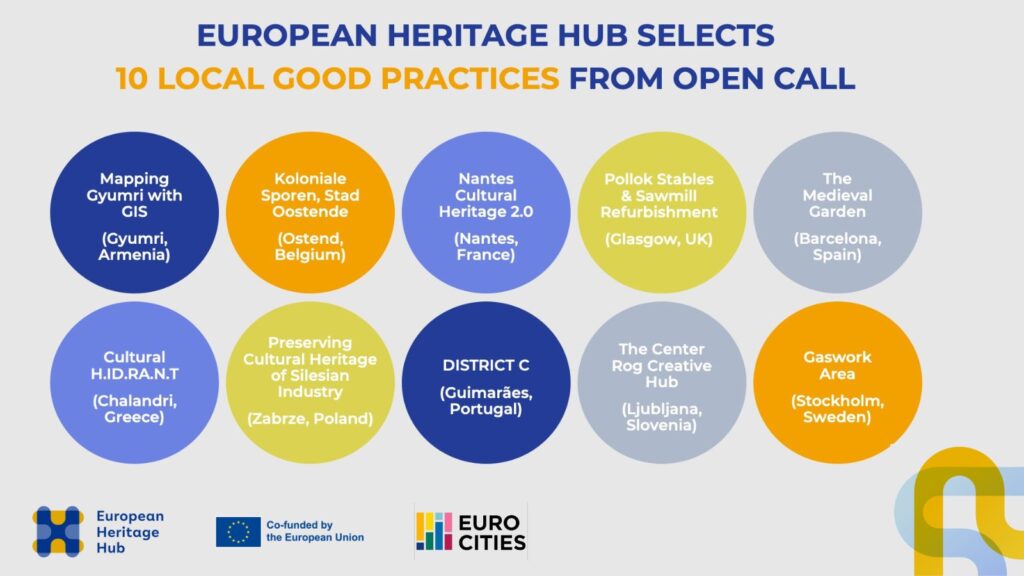The European Heritage Hub has announced the selection of 10 initiatives from its recent Open Call for Local Good Practices, aimed at identifying exemplary local practices in the field of cultural heritage that contribute to the green, digital, and social transformation of our society.
Running from November 2023 to January 2024, the call received 40 high-quality applications from 33 cities/regions across Europe. The selection criteria evaluated the alignment of submitted practices with the overarching themes of the Hub project, giving particular attention to the triple transformation concept and the innovative character of the initiatives. Additionally, the selection committee ensured a balanced representation of themes and locations.
This initiative will inform future capacity-building activities of the Hub. In 2024, peer-learning visits, each open to 20 participants, will be held in two cities selected among the 10 winners of the Call. There will be a third visit organised in the Caucasus in 2025.

The selected 10 practices are:
- ‘Mapping Gyumri with GIS – Citizen science initiative connecting scientific research with local communities’ (Gyumri, Armenia)
- ‘Colonial traces in Ostend – City plan against racism and discrimination focused on working with the colonial traces’ (Ostend, Belgium)
- ‘Nantes Cultural Heritage 2.0 – Digital portal developed with citizens for discovery of city’s heritage’ (Nantes, France)
- ‘Cultural H.ID.RA.N.T. (Hidden Identities ReAppear through Networks of WaTer) – Hadrian aqueduct as a vehicle for a green/blue urban regeneration, supporting active citizenship’ (Chalandri, Greece)
- ‘Preservation of the cultural heritage of Silesian industry via the creation of digital artifacts’ (Zabrze, Poland)
- ‘DISTRICT C – Creative Hub For Zero-Carbon Policies, Actions and Projects’ (Guimarães, Portugal)
- ‘The Center Rog Creative Hub – International creative and social centre in former bicycle factory’ (Ljubljana, Slovenia)
- ‘The Medieval Garden – Growing green for social inclusion and historical disclosure’ (Barcelona, Spain)
- ‘Gaswork area Stockholm – From closed industry to vibrant place for social interaction’ (Stockholm, Sweden)
- ‘Pollok Stables and Sawmill Refurbishment’ (Glasgow, UK)
“The selected practices highlight the pivotal role of cultural heritage in driving positive change and making a valuable impact. They serve as inspiring responses to local challenges, with the potential to influence policy solutions and provide transferable case studies for other regions. We are extremely pleased, alongside our project partners, to emphasise cities’ impact through the European Heritage Hub project. The green, digital, and social transition can only accelerate through multi-level collaboration”, stated Julie Hervé, Head of Culture at Eurocities, Co-beneficiary partner of the European Heritage Hub.
“We were very encouraged to see the enthusiastic response to this initiative. The themes of the European Heritage Hub pilot project align closely with the ongoing transformations in Europe – green, digital and social. These transitions require a true cultural transformation which starts at local level. Cities are strong allies, and their close proximity and direct engagement with citizens is essential for the success of our pilot project. The expertise of Eurocities, as a co-beneficiary of the Hub, was key to spotlight and advance these exemplary practices”, stated Carla Toffolo, Programme Manager of the Hub.
Each of the selected practices will be showcased in a series of dedicated articles to be published over the coming months. A variety of case studies, extending beyond the selected 10, will also be featured in four thematic webinars. More details to follow soon on the European Heritage Hub website.




